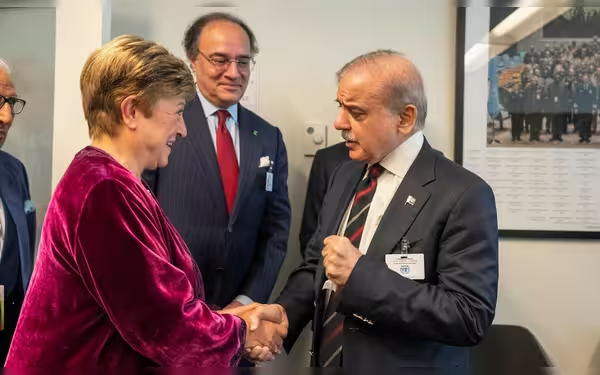Saturday, November 16, 2024 07:57 PM
Pakistan Secures Financing Assurances from China, UAE, and Saudi Arabia
- Pakistan receives $1 billion tranche from IMF for economic stabilization.
- China, UAE, and Saudi Arabia provide significant financing assurances.
- IMF praises Pakistan's economic turnaround and reform efforts.
 Image Credits: dawn
Image Credits: dawnPakistan secures $1 billion from IMF and financing assurances from China, UAE, and Saudi Arabia to stabilize its economy.
In a significant development for Pakistan's economy, the State Bank of Pakistan (SBP) announced on Friday that it has successfully received a $1 billion tranche from the International Monetary Fund (IMF). This funding comes as part of a new program aimed at stabilizing the country's economy. The announcement is particularly noteworthy as it follows the government's successful negotiations for additional financing assurances from key allies, including China, Saudi Arabia, and the United Arab Emirates. These assurances extend beyond a previous agreement to roll over $12 billion in bilateral loans owed to these nations.
The SBP's statement highlighted that the recent inflow of funds is a result of the IMF Board's approval of a 37-month Extended Fund Facility worth $7 billion. This facility is designed to support Pakistan's economic reforms and stability. The first tranche of special drawing rights (SDRs), amounting to 760 million, was received by the SBP and is expected to be reflected in the bank's liquid reserves by October 3. SDRs are international reserve assets created by the IMF to help member countries supplement their official reserves.
During a recent conference call, IMF Pakistan Mission Chief Nathan Porter refrained from disclosing specific amounts of additional financing committed by China, Saudi Arabia, and the UAE. However, he emphasized that these countries have provided significant financing assurances as part of the ongoing program. "I won’t go into the specifics, but UAE, China, and the Kingdom of Saudi Arabia all provided significant financing assurances joined up in this programme," Porter stated.
The IMF's Executive Board approved the new $7 billion loan agreement for Pakistan on Wednesday, which mandates the implementation of sound policies and reforms to enhance macroeconomic stability. This approval has resulted in an immediate disbursement of $1 billion to Pakistan, which has a history of 22 previous IMF bailout programs since 1958.
Porter noted that Pakistan has made a "really remarkable" economic turnaround since mid-2023, citing a dramatic decrease in inflation, stable exchange rates, and a significant increase in foreign reserves. He remarked, "So what we’ve seen is the benefits of undertaking good policies," while also stressing the importance of maintaining consistent monetary, fiscal, and exchange rate policies to foster stronger and sustained growth.
Last year marked a milestone for Pakistan as it achieved its first primary budget surplus in two decades. The current program aims to grow this surplus to 2 percent of the gross domestic product (GDP). Porter indicated that achieving this goal will require reforms to enhance tax collections from under-taxed sectors, such as retail.
The next review of the loan is anticipated to occur in March or April of 2025, based on performance criteria set for the end of 2024. In a related development, IMF Managing Director Kristalina Georgieva described her recent meeting with Prime Minister Shehbaz Sharif as "very productive." She stated, "We discussed Pakistan’s new Fund-supported program helping ongoing recovery, disinflation, increased tax fairness, and reforms to create new jobs and inclusive growth."
The recent financial support from the IMF, coupled with assurances from key international partners, marks a pivotal moment for Pakistan as it seeks to stabilize and grow its economy. The path ahead will require diligent implementation of reforms and policies to ensure that the benefits of this support translate into sustainable economic growth and improved living standards for the people of Pakistan.













